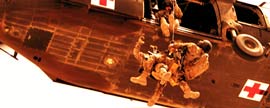Great question and one I believe we will see more often as the Army struggles with how to help Soldiers/Leaders after 13 years of combat. I reached out to one of our Legal SME’s and here is what I received:
Separation is most likely not appropriate in this case
**If this is a behavioral health related issue, then based on the information provided this Soldier should (most likely) not be separated for a pattern of misconduct or commission of a serious offense (CH 14-12b or 14-12c, respectively). Can he be given a FG Article 15, yes, but if the documentation mentioned supports his medical condition as the reason why he oversleeps, then he may consider refusing the Article 15 if the command pursues it that far. I would recommend this Soldier ask his BH doctor for a statement/diagnosis that supports the reason he oversleeps. Additionally, if his PTSD is causing these issues with missing formation, etc, then the Soldier should discuss with his BH doctor about being referred to the MEB/PEB process. This allows him to get the continued treatment he needs, as well as potentially being reassigned to the Warrior Transition Unit, where his only duty to go to appointments and process through the MEB/PEB process.
Get the Doctor and Command Involved
The command should be aware of the BH issues and the Soldier should be on their high-risk assessment list. If not, the Soldier, along with the BH provider, needs to make the command officially aware of the Soldier situation. This may provide the evidence to the command and they **may take a different approach.
The 1SG appears to be “old school” train of thought and does not take the PTSD seriously. His oversleeping could be medically related, especially if the BH has him on sleepoing medication. **It is also possible that the 1SG lacks the experience and knowledge as to the alternatives that should be considered for Soldiers with BH issues.
Bottom line
This Soldier needs to get his BH provider engaged with his command to make them aware of his diagnosis and prognosis.
Other Actions to Consider:
1) Use the Battalion CSM open door policy if he is officially notified of separation.
2) If he is ordered to present before the CSM or BN Cdr for a field grade Article 15, make sure he has the paperwork to back up his claims that the PTSD/treatment is preventing him from waking up. (Statement from BH provider; statement from leaders in support, etc.)
3) Speak with the Trial Defense Office if given the Article 15.
4) Speak with the Office of Soldier’s Counsel – this the legal office that provides services to Soldiers going through the MEB/PEB process. Even though he may not be in the program now, they may be able to provide him direction on how to handle this situation or legal options he has.
It may boil down to the 1SG not having credible **Documentation and Information in regards to the Soldier’s condition and that is why he is pursuing the UCMJ and chapter. Or, this 1SG could just be one of them that doesn’t believe in PTSD and its effect on the Soldiers. I have seem some that regardless of the diagnosis, they think every Soldier should be able to overcome any adversity and perform at a high standard. They believe the Soldier just isn’t trying hard enough.
**If the case is as described by the question a Chapter 5-13 (Personality Disorder) is not appropriate because the BH issues appear to be service connected.
Hope this helps.
Note: ** This part of the respond (underlined/Italics) modified by TOP.
Did you find this information useful? I would appreciate your feedback!
TOP
PS Thanks to ECK for sharing his experience on the matter as our Legal SME!














